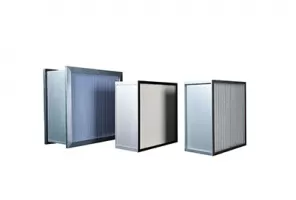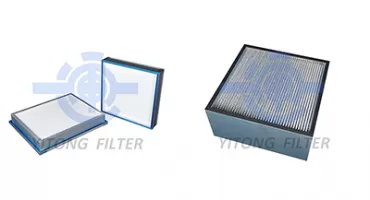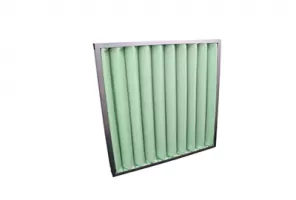 November 15, 2024
November 15, 2024
As energy demands continue to grow, gas turbine power plants remain a critical resource in producing reliable power efficiently. However, one of the challenges that gas turbines face is the quality of the air they intake. Without proper filtration, harmful contaminants can enter the system, causing erosion, corrosion, and fouling. This can lead to reduced efficiency, costly maintenance, and even turbine failure. This blog will explore the pivotal role of air filtration in gas turbine power plants, different types of filters available, and why choosing the right filtration system is essential for plant operators seeking to maximize efficiency and extend equipment lifespan.
In the demanding environment of a gas turbine power plant, air intake systems need to handle vast quantities of air. This air, however, can contain various contaminants, depending on the location and local environmental conditions. Common airborne contaminants include dust, salt, oil mist, and other particles that can significantly affect turbine performance.
- Dust and Dirt: Dust can accumulate on turbine blades, reducing aerodynamic efficiency and leading to overheating. Over time, this causes damage to the blades, impacting performance and requiring more frequent maintenance.
- Salt: Particularly in coastal environments, salt can enter the intake air and lead to corrosion. Salt deposits can increase maintenance requirements and shorten the lifespan of turbine components.
- Oil Mist: In industrial areas, oil mist from surrounding machinery can be drawn into the turbine intake. Oil particles stick to turbine blades, reducing efficiency and potentially clogging the system.
Contaminants affect turbine performance in multiple ways:
- Erosion: Particles erode critical components, leading to frequent repairs or replacement.
- Corrosion: Salt and other corrosive particles wear down turbine materials, leading to costly repairs and potential failure.
- Reduced Efficiency: A contaminated turbine has to work harder, reducing fuel efficiency and increasing operational costs.
The cost of maintaining a gas turbine is significant. Poor filtration leads to:
- Increased Downtime: Contaminated turbines require more maintenance and repairs, leading to operational downtime.
- Higher Fuel Costs: Contaminants decrease turbine efficiency, meaning more fuel is consumed to generate the same amount of power.
- Replacement Costs: Frequent replacement of eroded or corroded components adds to the financial burden.
Proper air filtration is essential to avoid these problems. With the right filtration system, power plants can minimize maintenance costs, improve fuel efficiency, and ensure reliable performance.
Selecting the right filter for a gas turbine depends on the specific environment and operational needs. Here, we’ll cover the most common filtration technologies used in gas turbines and their advantages.
High-efficiency particulate air (HEPA) and efficient particulate air (EPA) filters are popular choices for gas turbine air filtration. They are designed to capture fine particles, which are essential for protecting sensitive turbine components.
- HEPA Filters: HEPA filters can capture at least 99.5% of particles, making them ideal for environments with high dust or pollution. HEPA filters are particularly effective in preventing fine particles from reaching turbine blades.
- EPA Filters: EPA filters offer lower filtration efficiency than HEPA but are often used in applications where there is less contamination. They are also more cost-effective, suitable for environments where extreme filtration is not required.
E12-rated HEPA filters capture up to 99.5% of particles, making them highly effective at protecting turbines from both large and small contaminants. They are especially suited for gas turbines located in dusty environments, as they help reduce the frequency of maintenance and keep turbines running smoothly for longer.
Compact filters are designed to provide high filtration efficiency without taking up excessive space. They are particularly useful in power plants where space is limited or where modular installation is preferred. Compact filters also often feature multiple layers, allowing them to trap various particle sizes effectively.
As gas turbine technology has advanced, so too have air filtration systems. Modern filtration solutions are now designed to be more efficient, durable, and cost-effective.
Companies like Gore and Freudenberg have developed advanced filtration materials that are both highly efficient and durable. These materials can capture smaller particles and withstand harsh environmental conditions, maintaining low-pressure drop over extended periods.
New filter designs focus on compact, modular structures that make installation and maintenance easier. Multi-layered filters, for example, allow for high filtration performance without requiring bulky setups. This is particularly advantageous in tight spaces or plants where flexibility is essential.
Modern filtration systems are designed to last longer, reducing the frequency of replacements and maintenance. This helps power plant operators save on long-term costs by reducing the need for regular filter changes and ensuring consistent, efficient turbine performance.
Selecting the correct air filtration system for a gas turbine involves several considerations, including environmental conditions, cost, and operational efficiency.
Filters should be selected based on the local air quality and climate. For example:
- Coastal Locations: Turbines in coastal areas need filters that can handle high salt content to prevent corrosion.
- Dusty Environments: Areas with high dust levels require high-efficiency filters, like HEPA or E12 filters, to protect against particle buildup.
Higher-efficiency filters often have a higher upfront cost but save money over time by reducing the frequency of maintenance and fuel costs. Plant operators need to weigh the initial investment against the long-term benefits to find the best solution.
Each power plant has unique needs, and filtration systems should be tailored to fit the specific requirements of the turbine type and operational conditions. Custom solutions allow for optimal performance and efficiency, reducing operational risks and costs.
Investing in high-quality air filtration yields multiple benefits, from operational efficiency to reduced environmental impact.
By preventing contaminants from reaching critical components, effective air filtration helps extend the life of turbine machinery. This reduces the need for costly replacements and minimizes the risk of unexpected failures.
Cleaner air intake reduces the energy required to operate turbines, leading to better fuel efficiency. In a competitive industry, this improvement can be a significant advantage.
Cleaner, more efficient turbine operation means fewer emissions and a reduced environmental footprint. In an industry where regulatory compliance is increasingly important, air filtration is a critical factor in achieving sustainable operations.
Despite advancements, air filtration in gas turbines is not without challenges.
In certain environments, filters are subjected to high levels of dust, salt, or moisture, which can degrade performance. Advanced filtration systems are designed to withstand these conditions, but regular maintenance is still necessary.
Filters wear out over time, especially in high-load conditions. Innovations in materials and design help mitigate this, but wear and tear remain a challenge that power plants must address.
Upgrading to a high-performance filtration system can seem costly, but the long-term benefits make it worthwhile.
Improved filtration reduces the need for maintenance, extends equipment life, and improves efficiency. These factors contribute to a strong ROI over time.
While high-efficiency filters may have a higher upfront cost, they reduce operational costs over time by improving fuel efficiency and reducing the frequency of repairs.
The air filtration industry continues to evolve, with exciting advancements on the horizon.
Smart filtration systems with integrated sensors provide real-time data on filter condition, enabling predictive maintenance. This reduces downtime and ensures that turbines operate at peak efficiency.
As environmental concerns grow, more companies are developing sustainable filtration options, including recyclable and biodegradable filters.
Plant operators can ensure optimal turbine performance by following a few key practices:
- Routine Maintenance: Regularly inspect filters and replace them as needed to maintain efficiency.
- Customized Solutions: Work with filtration experts to develop custom solutions that meet the specific needs of the plant’s location and environmental conditions.
- Investing in High-Quality Filters: High-quality filters provide long-term savings by reducing operational costs and improving fuel efficiency.
Investing in high-quality air filtration for gas turbines is essential for power plants looking to maximize efficiency, reduce costs, and extend equipment life. With the right filtration system, power plants can achieve these goals while contributing to a cleaner environment. By choosing advanced, durable, and efficient filters, power plant operators can ensure that their gas turbines operate at peak performance for years to come.
 Jan. 07, 2025
HEPA and MERV 17 Filters: The Ultimate Guide to High-Efficiency Filtration
Jan. 07, 2025
HEPA and MERV 17 Filters: The Ultimate Guide to High-Efficiency Filtration
 Aug. 10, 2023
Do you understand HEPA Filter?
Aug. 10, 2023
Do you understand HEPA Filter?
 Jun. 13, 2024
Comprehensive Guide to Panel Air Filters
Jun. 13, 2024
Comprehensive Guide to Panel Air Filters

